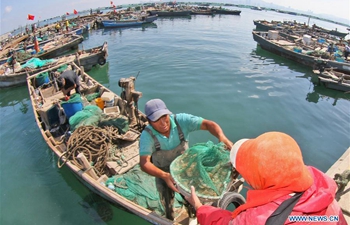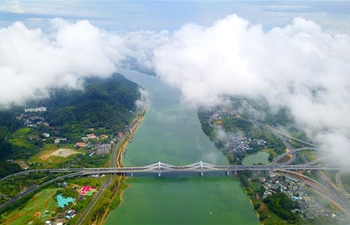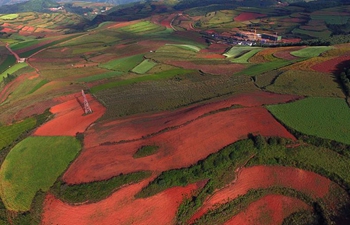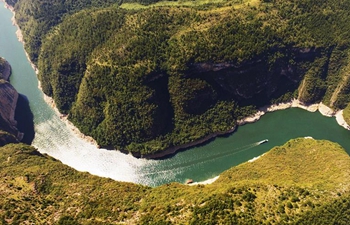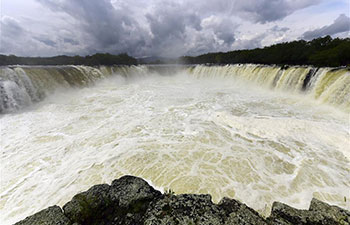by Xinhua writer Zhang Zhengfu
BEIJING, Sept. 2 (Xinhua) -- Claims that China's investment in Africa is creating a debt crisis are misleading and false.
It is a fact that China has been investing more and more on the continent, up nearly 40 times since 2003.
However, it is irresponsible to exaggerate Africa's debt problem in the first place. In statistical terms, overall debt level of African countries is nothing comparable to some developed economies.
It is also wrong to blame China for it, and neglect what China's investments have made happen on the continent.
From 2000 to 2016, China's loans only accounted for 1.8 percent of Africa's foreign debts, and most of them are offered to infrastructure.
None of the African countries has once complained about being trapped in debt crisis because of their cooperation with China. On the contrary, many leaders of African countries have praised China's investment and financing cooperation with them, and are looking forward to greater cooperation with China in this respect.
Debt has long been an issue for Africa. In the 1970s-1980s, there were IMF documents devoted to Africa's debt problem. For infrastructure-starved poor countries eager to speed up industrialization, debt tends to rise.
Some new factors add to the debt issue. Resource-based African economies, who have been reeling from a slump in commodities prices over recent years, have seen their debts surge. And the U.S. Fed's rate hikes which pushed up the U.S. dollar made the situation even worse.
Debt is not an African issue. Research by the London-based Jubilee Debt Campaign in 2017 showed that debt payments by poorer countries had increased by 50 percent in two years and had reached their highest level since 2005.
In addition, it is filled with hypocrisy to turn a blind eye to the benefits that the Chinese investment has brought to the continent.
A recent Washington Post article by Professor Deborah Brautigam, director of the China Africa Research Initiative at Johns Hopkins School of Advanced International Studies, may shed some light on the issue.
After assembling databases of Chinese loans provided since 2000, scholars at Boston University and Johns Hopkins University concluded that "by and large, the Chinese loans in our database were performing a useful service: financing Africa's serious infrastructure gap," according to the article titled "U.S. politicians get China in Africa all wrong."
On a continent where over 600 million Africans have no access to electricity, 40 percent of the Chinese loans paid for power generation and transmission. Another 30 percent went to modernizing Africa's crumbling transport infrastructure, the research has found.
Just take the past three years as an example. In late 2015, China announced "ten cooperation plans" to support Africa. Projects completed and still under construction in these plans are expected to bring the continent 30,000 km of highways, 85 million tonnes per year of harbor capacity, over 9 million tonnes per day of water-cleaning capacity and about 20,000-megawatt power generating capacity while creating some 900,000 local jobs.
By the end of 2017, China has invested over 100 billion U.S. dollars on the continent in total. Most of the funding went to infrastructure projects such as the 480-km Mombasa-Nairobi Standard Gauge Railway that lays the foundation for growth and prosperity.
It is not just infrastructure. Hundreds of schools, vocational education centers, and hospitals have been built, and nearly half a million patients have been cured by Chinese medical teams.
Lina Benabdallah, a political science professor at Wake Forest University, studies Chinese investments in African human resource development programs. "When Africans are thinking about technology and skills, they are thinking of China as a valid option," she said.
In this sense, instead of the so-called debt trap, Chinese investment has brought hope to Africans who want to break the cycle of poverty and live a better life.
This is why it is unjustifiable to demonize Chinese investment in Africa and label Chinese lending as "predatory." Why the money is sweet "money pie" when it is offered by certain countries, but a dark "money trap" when offered by China?
What have these finger pointers done for Africa?
In the 1960s, Tanzania and Zambia, who just shook off the shackles of colonialism and are desperate for development, turned to certain developed countries for assisting with the building of a railway linking the two countries, only to be turned down.
Very disappointed, the two countries approached China. Much to their surprise, China, also an impoverished country and a victim of foreign aggression and suppression, agreed to lend a hand, at the cost of some of its own infrastructure projects.
Starting from that point, African people came to understand, "a friend in need is a friend indeed."




